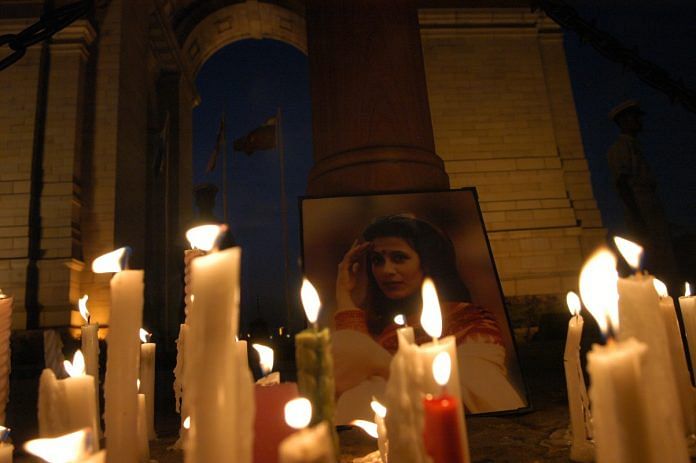Can forgiveness come in the absence of justice? The fact is, Manu Sharma has already served most of his term.
In a letter to the welfare board of Tihar Jail, Sabrina Lal said she had no objection to the release of Manu Sharma, who murdered her sister in 1999. She stated she had forgiven him since he spent fifteen years in jail and did “good work for charity” and helped “inmates in jail”, which according to her is “a reflection of reform”.
The infamous murder of model Jessica Lal for refusing a drink to the son of a prominent political leader, Venod Sharma, shook the country. The Delhi High Court finally sentenced Manu Sharma to life imprisonment in 2006.
However, Sharma is not the first to be forgiven by the relatives of murder victims in India.
In 2008, Priyanka Gandhi met Nalini Sriharan, one of the conspirators in her father Rajiv Gandhi’s assassination, at a prison in south India. It was an act of coming to peace with the ‘loss and violence’ she had experienced. Nalini’s death sentence was commuted to life imprisonment because of Sonia Gandhi’s plea.
Earlier in March this year, Rahul and Priyanka Gandhi stated they had “completely forgiven” their father’s killer at an event in Singapore. “I remember when I saw Mr Prabhakaran (former chief of the Liberation Tigers of Tamil Eelam, the group that masterminded the assassination) on TV, lying dead… I felt really bad for him and for his kids, and I did that because I understood deeply what it meant to be on the other side of that thing,” said Gandhi.
In 2013, Avantika Maken forgave the assassin of her father, Congress leader Lalit Maken.
“I think as a society we need closure. There are too many festering, open wounds,” said Avantika.
When she came across her father’s murderer, Ranjit Singh Gill alias Kukki, initially she was hesitant to forgive him. However, many Congress leaders wanted her to. It was when she met his family that she finally changed her mind. Her parents wouldn’t come back, but she could save another family, she realised.
That the cost of violence isn’t only paid by the victims, but also the perpetrators, is a little-understood fact.
Kukki, who was imprisoned for life, was released because of Avantika did not object to his mercy petition. He has now become a basketball coach in Ludhiana and has managed to turn his life around.
But forgiveness is a luxury not all can afford.
At the other end of the spectrum are those clamouring for justice.
Neelam Katara, mother of Nitish Katara, who was murdered over his affair with Bharti Yadav, daughter of UP politician D.P. Yadav, still continues her battle for justice. “There is no implementation of the laws, that’s why the rich and influential people are not scared. Am I supposed to spend my life filing RTIs about whether they are out on parole again?”
Neelam had also called out the corruption of politicians, which allowed them to get in and out of jail, and even have life sentences reduced. She has said that the life sentence, by itself, a misnomer.
“In 14 years’ imprisonment, criminals get out of jail — even earlier on remission — and keep coming out on parole. This judgment of 25 years without remission will be a deterrent,” she said.
Neelam Krishnamoorthy also waged a two-decade-long war for the 59 victims of the Uphaar cinema fire in which her two children had perished. “The Supreme Court has deeply disappointed the kith and kin of victims of the Uphaar tragedy. The verdict has murdered justice. It would have been better if I had picked up a gun 20 years ago to seek justice for my children. I would have served 14 years, by now would have been out of jail, and in peace.”
The Ansal brothers, owners of the south Delhi cinema hall and main accused, were granted a reduced sentence.
In times when the clamour for death penalties is all around, one has to wonder where forgiveness can find space to exist.
At the end of the Mahabharata, Gandhari curses Krishna for murdering her hundred sons. She curses him saying none of his children will survive. Krishna finally breaks the cycle of violence by not returning her curse.
But the moot question is: Can forgiveness come in the absence of justice? The fact is, Manu Sharma has already served most of his term. His legal advisors say he would have gotten out soon, regardless of Sabrina Lal’s forgiveness.




Unfortunately so, because India’s gender bias and inequality, pay inequity, cow belt communal and castist racism, and sheer lack of opportunity for anyone except politicians and their families, is beyond repair.